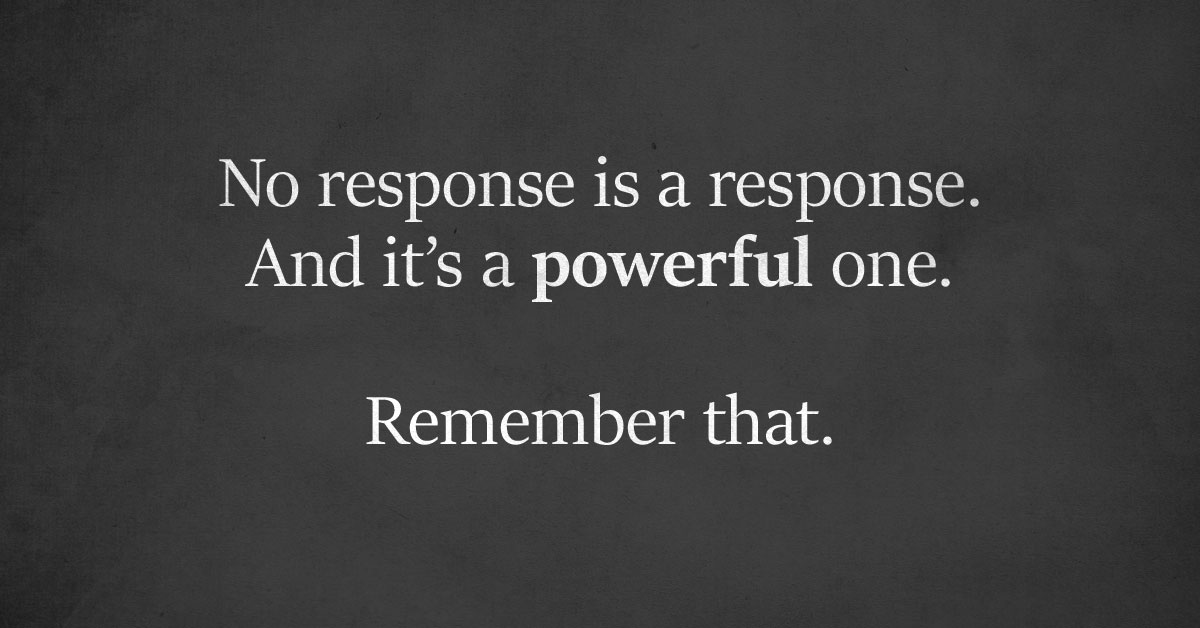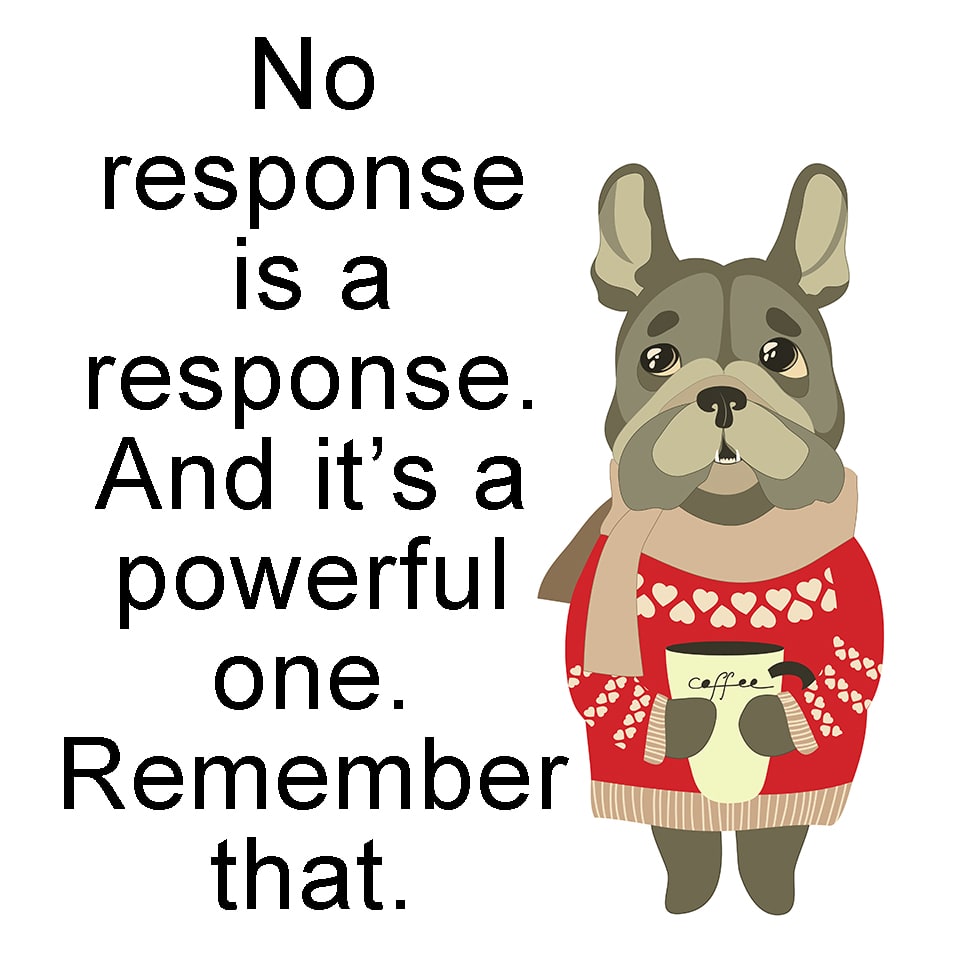No Response Is A Response: Understanding The Silent Communication
Have you ever found yourself waiting for a reply that never comes? Whether it's a text, an email, or even a job application, the silence can feel deafening. But here's the thing—no response is a response in its own way. The absence of communication isn’t always a bad thing, but it definitely carries meaning. In today’s fast-paced world, silence can speak volumes, and understanding it can be a game-changer.
In our hyper-connected society where messages are sent and received within seconds, people often overlook the power of silence. When someone doesn’t respond, it’s not just an oversight—it’s a form of communication. This concept has been studied by psychologists, business experts, and even relationship counselors. It’s a universal truth that applies to everything from personal interactions to professional settings.
So, why does this matter? Because ignoring the significance of "no response is a response" can lead to misunderstandings, frustration, and missed opportunities. By the end of this article, you’ll have a deeper understanding of how silence works, why it happens, and what you can do about it. Let’s dive in, shall we?
Read also:Courtney Roker Age Unveiling The Life Career And Achievements
Table of Contents
- What Does It Mean When No Response Is a Response?
- The Psychology Behind Silence
- No Response in Professional Settings
- Silence in Personal Relationships
- No Response in Job Applications
- How to Handle No Response Gracefully
- Common Miscommunication Issues
- Long-Term Effects of Silence
- The Role of Technology in Silence
- Wrapping It Up: No Response Is a Response
What Does It Mean When No Response Is a Response?
Sometimes, the lack of a reply is more telling than the reply itself. Imagine sending an important email to a potential client or even a simple text to a friend, and you get crickets. That silence isn’t just empty space—it’s a form of communication. It could mean a variety of things, from disinterest to deliberate avoidance. But whatever the reason, it’s crucial to recognize that silence isn’t neutral.
Understanding the Context
The meaning of silence depends heavily on the context. For example, in a professional setting, a lack of response to a proposal might indicate that it wasn’t compelling enough. On the other hand, in a personal relationship, silence could be a sign of emotional distance or even a cry for space. It’s all about interpreting the cues and understanding the bigger picture.
Here’s a quick breakdown of what silence might mean:
- Disinterest: The person might not be engaged or interested in the conversation.
- Overwhelm: They could be too busy to respond, or the message might have been overlooked.
- Conflict Avoidance: Some people avoid responding when they’re uncomfortable or unsure how to proceed.
- Deliberate Ignoring: In some cases, silence is a deliberate strategy to avoid confrontation or commitment.
The Psychology Behind Silence
From a psychological perspective, silence is a powerful tool. It can be used intentionally or unintentionally, and its effects vary depending on the situation. According to research published in the Journal of Communication, silence can evoke strong emotional responses, ranging from curiosity to anxiety. It’s a double-edged sword that can either strengthen or weaken relationships.
Read also:Sophie Demuok The Rising Star In The Entertainment World
Silence as a Defense Mechanism
Many people use silence as a defense mechanism when they’re feeling threatened or unsure. For instance, in a heated argument, one party might choose to remain silent rather than escalate the conflict. This behavior, while sometimes effective, can also lead to misunderstandings if not addressed properly.
Here are some psychological reasons behind silence:
- Emotional Withdrawal: People often retreat into silence when they’re overwhelmed by emotions.
- Cognitive Overload: Too much information can cause a person to shut down and stop responding.
- Strategic Silence: In negotiations or discussions, silence can be used to gain leverage or control the conversation.
No Response in Professional Settings
In the workplace, silence can have significant implications. Whether it’s a lack of feedback from a manager or a delayed response to a proposal, the absence of communication can create uncertainty and reduce productivity. Understanding how to interpret and respond to silence in professional settings is essential for career success.
Common Scenarios in the Workplace
Here are a few scenarios where silence might occur in a professional environment:
- After submitting a job application, you don’t hear back from the employer.
- Your manager ignores your request for a raise or promotion.
- A client doesn’t respond to your proposal or inquiry.
In these situations, it’s important to follow up politely and professionally. Persistence can sometimes make all the difference, but it’s also crucial to know when to move on.
Silence in Personal Relationships
When it comes to personal relationships, silence can be particularly painful. Whether it’s a romantic partner, a family member, or a close friend, the absence of communication can lead to feelings of rejection and insecurity. But silence isn’t always negative—it can also be a way for someone to process their thoughts and emotions.
How to Navigate Silent Periods
Here are some tips for dealing with silence in personal relationships:
- Give the other person space to think and reflect.
- Communicate openly about your feelings and concerns.
- Avoid jumping to conclusions or assuming the worst.
Remember, silence isn’t always a bad thing. Sometimes, it’s just a pause in the conversation that leads to deeper understanding.
No Response in Job Applications
Applying for jobs can be a frustrating experience, especially when you don’t hear back from employers. The lack of response can feel like rejection, but it’s often just a reflection of the competitive job market. Understanding why companies don’t respond and how to improve your chances of getting noticed can make all the difference.
Why Companies Don’t Respond
Here are a few reasons why companies might not respond to job applications:
- High Volume of Applications: Many companies receive hundreds of applications for a single position, making it impossible to respond to everyone.
- Inadequate Fit: If your resume or cover letter doesn’t meet the requirements, you might not get a response.
- Internal Hiring Processes: Some companies prioritize internal candidates or take longer to make decisions.
While it’s disappointing, it’s important to stay positive and keep applying to other opportunities.
How to Handle No Response Gracefully
Dealing with silence can be challenging, but there are ways to handle it with grace and professionalism. Whether it’s in a personal or professional context, the key is to remain calm and avoid overreacting. Here’s how you can approach silence in a constructive way:
Steps to Take When Facing Silence
- Reflect on the situation and consider possible reasons for the silence.
- Send a polite follow-up message if appropriate.
- Focus on what you can control and move forward.
Remember, silence doesn’t always mean rejection. Sometimes, it’s just a temporary pause that leads to something better.
Common Miscommunication Issues
Silence often leads to miscommunication, which can strain relationships and hinder progress. Whether it’s a missed email or an unreturned phone call, the lack of communication can create confusion and frustration. To prevent these issues, it’s important to establish clear expectations and communication protocols.
Preventing Miscommunication
Here are some strategies for reducing miscommunication:
- Set clear deadlines for responses and follow-ups.
- Use multiple communication channels to ensure your message is received.
- Clarify any misunderstandings as soon as possible.
By taking proactive steps, you can minimize the negative effects of silence and improve your communication skills.
Long-Term Effects of Silence
Prolonged silence can have lasting effects on both personal and professional relationships. In the workplace, it can lead to decreased morale and trust. In personal relationships, it can cause emotional distance and resentment. Understanding these long-term effects is crucial for maintaining healthy connections.
Building Resilience Against Silence
Here are some ways to build resilience against the negative effects of silence:
- Focus on building strong communication habits.
- Practice empathy and understanding when dealing with silence.
- Seek feedback and clarification when necessary.
By addressing silence head-on, you can prevent it from causing lasting damage.
The Role of Technology in Silence
In today’s digital age, technology plays a significant role in how we communicate. While it has made communication faster and more convenient, it has also contributed to the rise of silence. With so many messages being sent and received every day, it’s easy for important communications to get lost in the noise.
How Technology Affects Silence
Here are a few ways technology influences silence:
- Information Overload: With so much content being shared, important messages can get overlooked.
- Instant Gratification: The expectation of immediate responses can lead to frustration when silence occurs.
- Asynchronous Communication: Different time zones and schedules can create delays in responses.
While technology has its challenges, it also offers solutions. By leveraging tools like automated reminders and follow-up systems, you can reduce the impact of silence.
Wrapping It Up: No Response Is a Response
In conclusion, silence is a form of communication that deserves attention and understanding. Whether it’s in personal relationships, professional settings, or even job applications, the absence of a response carries meaning. By recognizing the power of silence and learning how to interpret it, you can improve your communication skills and build stronger connections.
So, the next time you find yourself waiting for a reply, remember this: no response is a response. Use it as an opportunity to reflect, communicate, and grow. And don’t forget to share your thoughts in the comments below or check out our other articles for more insights!

